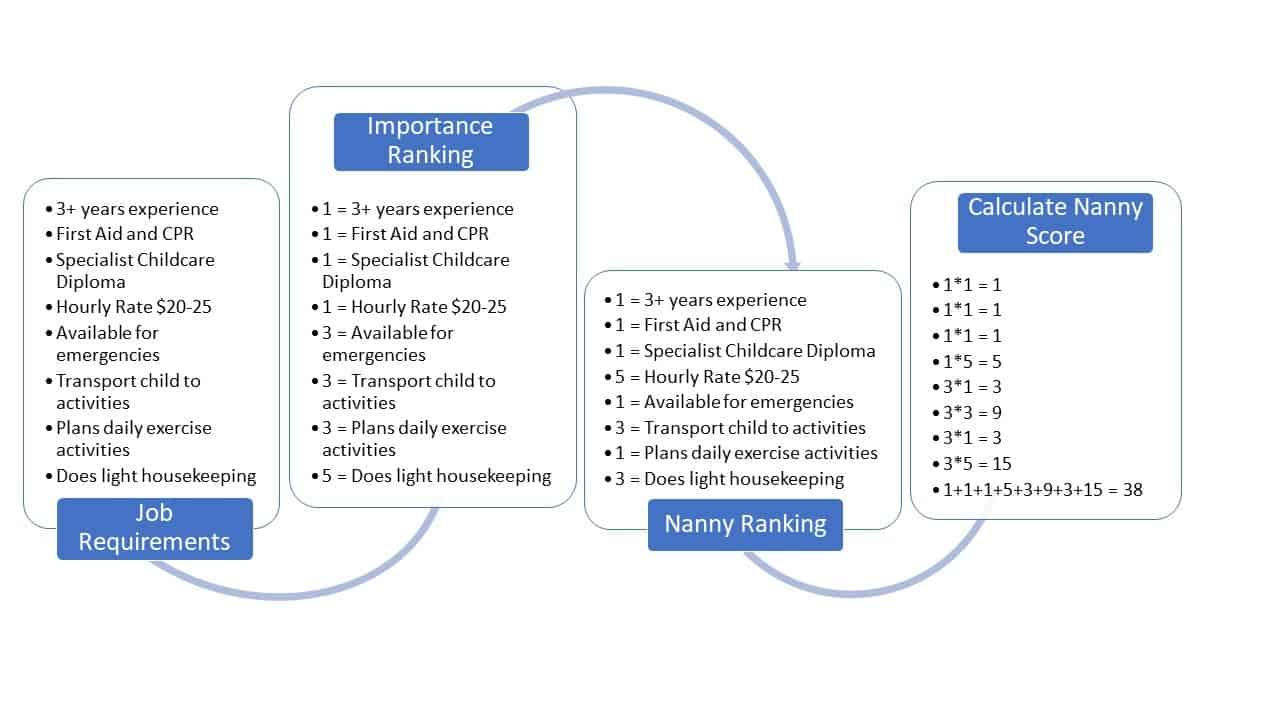After all the interviews and discussions with potential nannies, you’ve got 2 great candidates! You’ve already disqualified candidates that didn’t have nanny training, didn’t have the years of experience desired, or required a wage outside your budget. It seems simple enough but picking the right person to hire can be challenging. How will you decide which is the better fit for your kids and your family?
The first thing to do is to review your interview notes. Make sure each candidate meets or exceeds the job requirements and is willing and able to perform the identified duties. If both candidates pass this review, it may help to think about realistic scenarios and desired behaviors. What personality traits and characteristics best fit with your family? Children prefer consistency, so selecting a nanny with similar traits can help them transition between nanny supervision to parents taking over after work. What about diversity and expanding the children’s experiences? There may be traits that you want the nanny to model such as courtesy, self-confidence, or a love for learning. If you and your spouse are more introverted, you may want a nanny who is more extroverted so the children can learn how to engage with different personality types.
If this subjective analysis doesn’t help you come to a decision, you may want to try other methods such as the Analytical Method and/or the Behavioral Method. Some families prefer mathematical and analytical evaluation methods while other families will want more of a personal engagement or subjective approach to help assess candidates. It is rare to find candidates that meet or exceed all your requirements, so it may be beneficial to use both of these methods to help you choose.
The goal is to pick the right nanny for you and your children so there is no definitive strategy or process, it’s up to what works for you. The decision criteria for one family will be different from every other family. Hiring a nanny is a professional but also a deeply personal choice.
Nanny Assessment – Analytical Method
For the analytically minded, you can create a scoring system. This can be done before interviews begin and all candidates can be scored, or it can be used when you’ve narrowed it down to the final 2 candidates. Each family’s requirements and prioritization will be unique, but here’s a chart that can help you get started. First, list all the attributes important to the positions. Then, rank each job requirement by its level of importance such that 1 is absolutely required, 3 is desired, and 5 is nice to have.
With the job requirements identified and ranked, you can compare the fit for each nanny candidate. For this step, each candidate is ranked on how well they meet each job requirement (1=exceeds, 3=meets, 5=does not meet). The column values are then multiplied together to get a numerical score. The lower the total score, the better the candidate meets the requirements. Here’s an example:

This type of analytical assessment can help you clearly identify which candidates better meet your needs. Make sure that candidates meet or exceed all absolutely required (#1 ranked) job requirements and disqualify those that don’t.
Nanny Assessment – Behavioral Model Method
For those who are synthetically minded, you can assess the candidates qualitatively using the Behavior Model method. Start by identifying the traits that are important to you and note how each candidate demonstrated or communicated these traits. Young children learn by watching others, so it’s important to consider the behaviors you want your children to experience, mimic and learn. Here are a few traits to think about when interviewing and assessing a nanny:
- Courtesy. How did the candidate act during your meetings? Did they arrive on time, dressed appropriately, and speaking respectfully? Children watch adults’ daily interactions with others, and we need to make sure they learn courtesy and accepted social norms. Did the candidate share a story about how she taught a child to give up their subway seat to an elderly passenger or held the door for a Mom with a stroller?
- Self-Confidence. Did the candidate exhibit self-confidence? Children need to feel safe and secure and if they think an adult is scared or unsure, then they may feel insecure or anxious. A little nervousness is normal in a job interview, but it shouldn’t prevent the candidate from showing that they feel secure in their ability to successfully perform their duties. On the other hand, a candidate who displays an overabundance of self-confidence may come across as a braggart and may not be the desired role model for your children.
- Love for Learning. Children see the world in wonderful and surprising ways. Because of their curiosity, they often see things that adults overlook. They may love to listen to stories or make up their own. Did the candidate share any stories about how well they listened to a child’s story, how they encouraged a child’s imagination and interests, or that they loved learning new jokes from their 7-year-old charge? These can help foster a love of learning in children.
These are just three potential traits to consider and each family will have a unique list that is important to them. Additional traits may include communication techniques, listening skills, openness to new experiences, patience, compassion, friendliness, stress management (both for the children and the Nanny), and volunteerism.
Hiring a nanny to provide childcare when you are at work or away from the home is a huge decision. If you are fortunate enough to have more than one qualified candidate, take a few minutes to think about how each candidate behaved during the interview process and during any subsequent meetings. If appropriate, discuss your results and feelings with other family members and make your selection.


Recent Comments